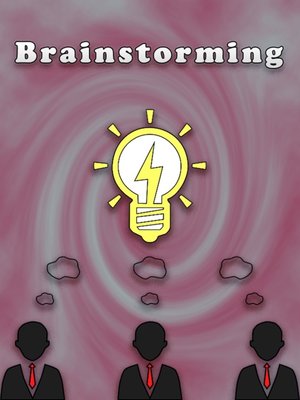Brainstorming
ebook ∣ Become a Brainstorming Facilitator by Learning These Techniques.
By John Hawkins

Sign up to save your library
With an OverDrive account, you can save your favorite libraries for at-a-glance information about availability. Find out more about OverDrive accounts.
Find this title in Libby, the library reading app by OverDrive.



Search for a digital library with this title
Title found at these libraries:
| Loading... |
Creative ability is most frequently the opposite of good judgment.
Creative ability includes the tendency to experiment with novel ideas that might be unsound. It includes a good deal of the gambler's spirit where the individual "sticks his neck out" and tries something new, perhaps even "wild" or "crazy." Therefore, by its very nature, creative ability is on the opposite end of the scale from good judgment.
But must judgment be developed at the expense of imagination?
we have had experience that proves that ideas can be stimulated and that a climate can be developed, and maintained, in which ideas— as well as good judgment—flourish. We have drawn freely on all sources of research and information and have reached these conclusions, for example, as to what a creative person is.
In the first place, he has a sensitivity to problems. Then he also has a fluency with ideas in that he thinks of a lot of approaches to a problem. Many of these ideas are characterized by novelty. His ideas are new and perhaps different.
The creative man is flexible, able to drop one line of thinking and easily take up another one. Also, he has a quality that has been described as constructive discontent, a certain restlessness of mind, searching for new and better ways of doing things.
In other words, if we were to draw a line to represent the various degrees of creative ability and sound judgment, we would put great creativity at one end and sound judgment at the other. The better manager, when rated along this line, would be much closer to the good judgment end than to the creativity end. So we immediately see that a "good manager" may automatically constitute a barrier to an atmosphere that fosters creativity. Consequently, this is a real challenge to business leaders: how to combine a flow of creative new ideas with sound evaluation.
Yet I feel that it is absolutely necessary to cultivate the "idea atmosphere" if an organization is to forge ahead day after day. Business, just as art, needs a climate of open-mindedness—and should not be wary of non-conformists or men who continually pose ideas that run contrary to our orthodox thinking.
When a person is faced with a problem, it seems natural to fall back upon previous experience for answers. In most cases, judgment dictates what is most practical or what has worked in the past. This judgment is the end result of training, which has been instilled in the individual throughout most of his life. From the time the child is old enough to comprehend, he is taught to do what is "best" for himself and for others. He is trained to do the "right" thing. This, then, is the beginning of judgment. This process continues throughout his growth to maturity.
What happens during this period when judgment is developing? What was there before judgment developed? Let's look at a young child. One is immediately struck by his power of imagination. Everything is "real" to him. Everything is alive. The stick he picks up and aims is a gun. The tree he climbs is a mountain or a ship's lookout platform.
Imagination is tolerated in a child but not always encouraged. As he grows older, he is impressed with the fact that his imagination, while a source of amusement, is often not practical. Thus we see that judgment may take the place of imagination completely—or that imagination will be used less and less as judgment is used more and more.
Theoretically, this could lead to a person's having all judgment and no imagination—and don't we seem to run into those persons? Don't some people seem to rely entirely on precedent and experience and seem afraid to try a new slant?
More than one...






